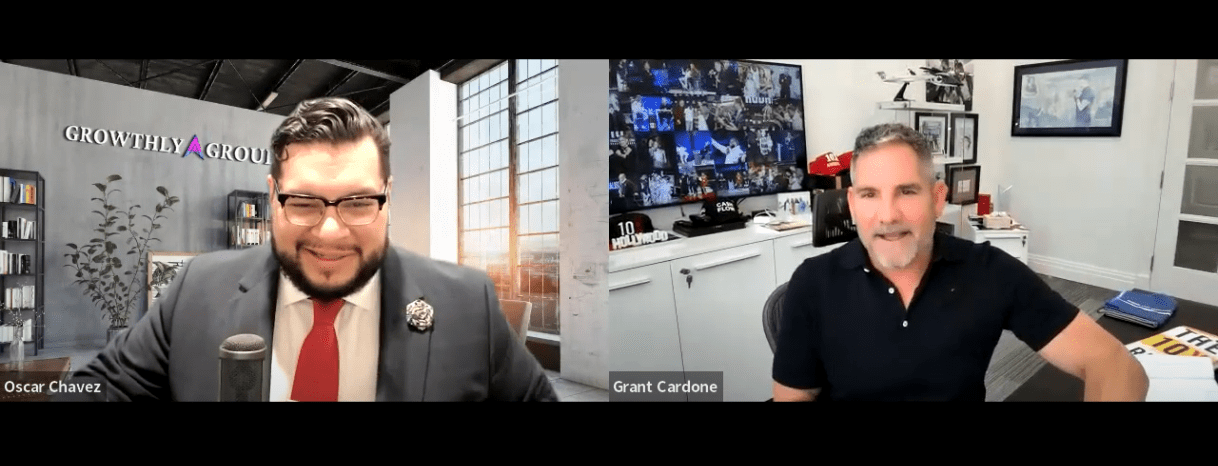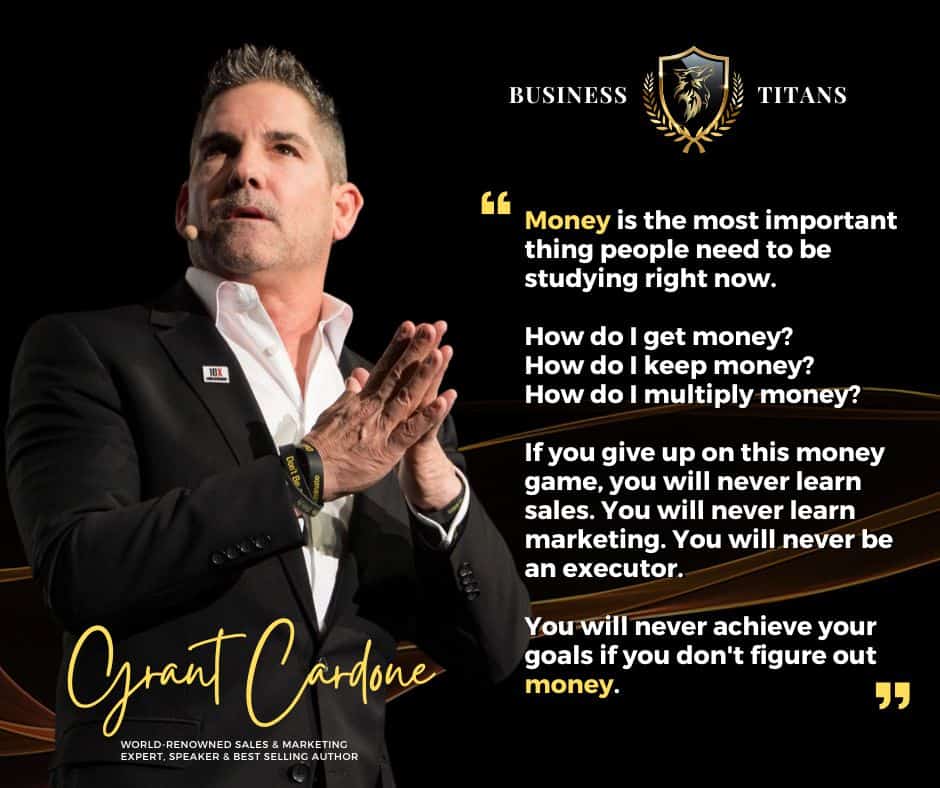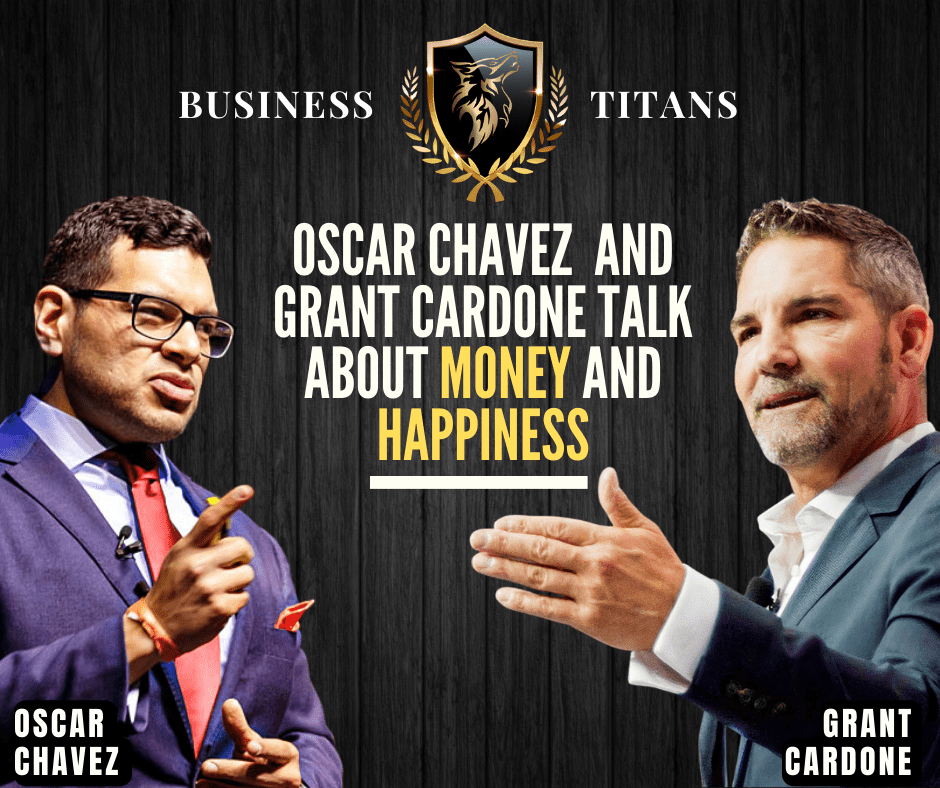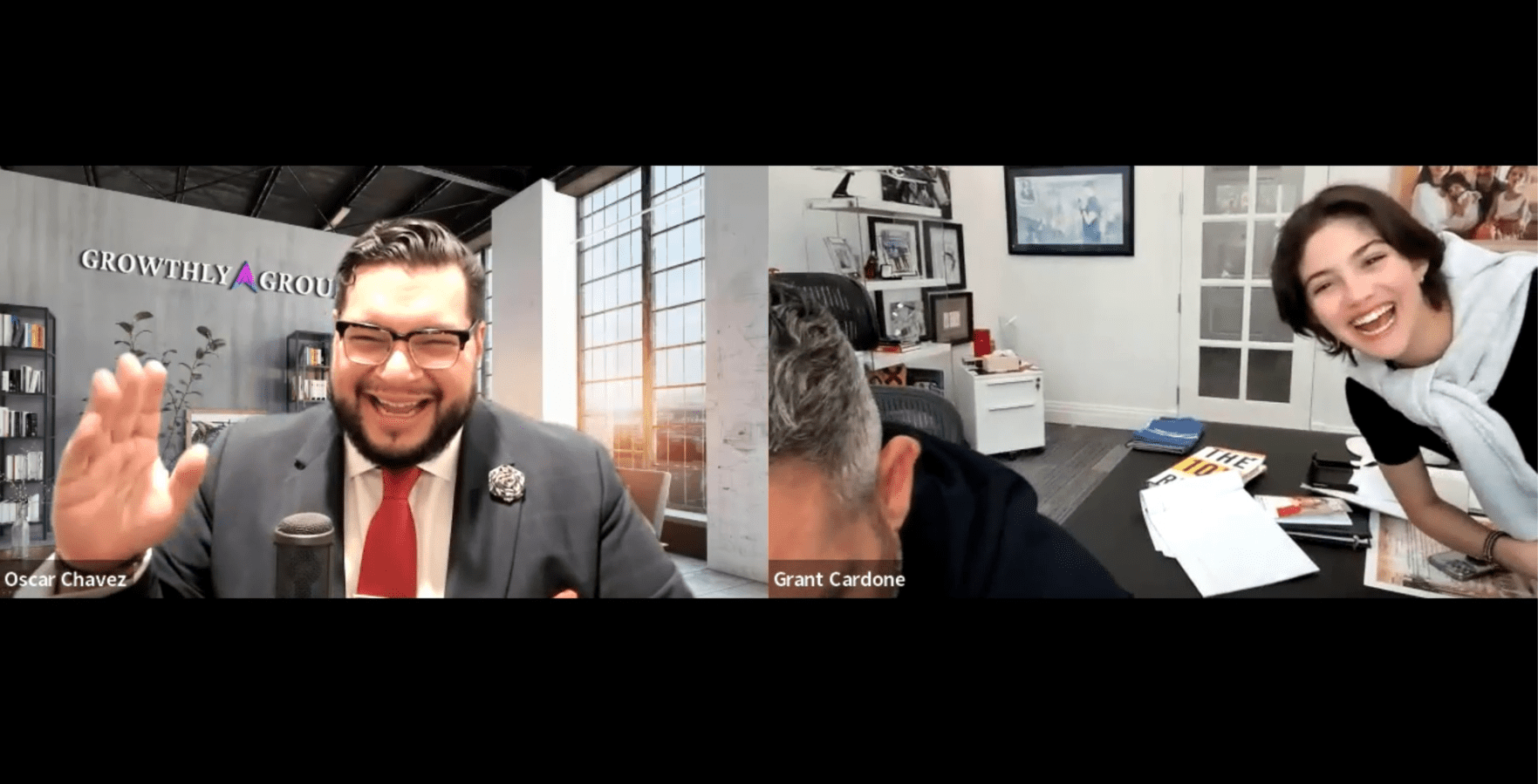Business Titans Interview Grant Cardone
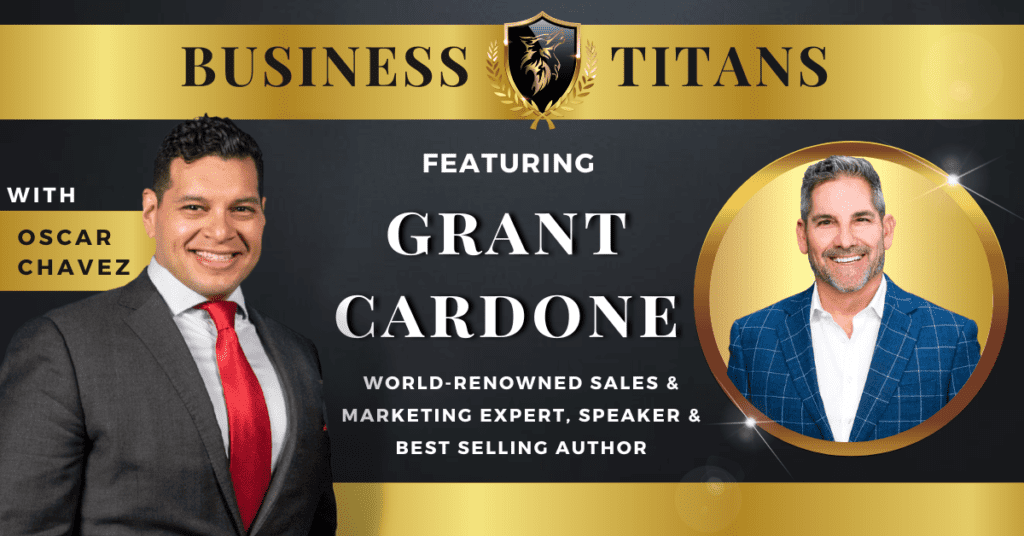
Oscar Chavez:
Welcome to the Business Titans podcast, where we explore everything to do with growing and scaling your business.
I'm your host, Oscar Chavez. And in this podcast, we talk to world leaders, game changers and Business Titans. We continue our series this year with my esteemed guest, Grant Cardone.
Grant owns and operates seven privately held companies and private equity real estate firm Cardone capital with multi-family portfolio assets worth over $5 billion.
He's one of the top crowd funders in the world raising over 800 million in equity via social media. Grant is also a New York Times Best Selling author of business books, including The 10X Rule, which led to Cardone establishing the 10X global movement, and the 10X Growth Conference which is now the largest business and entrepreneur conference in the world.
How are you going today, Grant?
Grant Cardone:
Hey, good, my friend.
Thank you so much for having me, I'm multitasking with you and it's 1:30 in the morning for you and I'm doing this and that, so I'm so glad to be with you.
I hope that we can share some information that inspires and gives your audience something they can go out and do.
Oscar Chavez:
Wonderful. Thanks for that, Grant. So, you are one of the world's leading, if not THE world's leading authority in sales.
So tell me, Grant, out of all the knowledge and experiences that you've acquired, what realisations are you having right now that are being revealed to you that helps you ramp the performance of your sales team?
Grant Cardone:
Well, number one, I would tell you that marketing is senior to the sales game. Like if you're asking me what is being revealed to me, that's different than what I believed 10 or 15 or 20 years ago.
When I was on the come up, I didn't have any money, so I couldn't think about marketing. The technology, Instagram and YouTube, and the ability to market yourself did not exist in the world that I lived in at the time. So, we had, you know, technology was a phone, it was a telephone, but my phone when I grew up, my phone, I couldn't even bring it with me.
You imagine like I grew up in a different time than today. So I had to learn how to knock on doors and get face to face with people.
Fast forward 30 years, you don't have to do that. So today the game is marketing. So the takeaway there is marketing is senior to the sales game.
My number one job at my company is to make sure that the lead, the customer, my funnel is so filled with hot prospects, that my salespeople are taking sales calls rather than making sales calls. And that is possible for anyone today.
You know, I started my YouTube channel and then my Instagram was started. Well, my YouTube channel was started maybe 12 years ago. If you look at some of those old posts, I had 48 views. My Instagram was started less than eight, or nine years ago, I think. Is the date on it? Yeah. I didn't have any social media until the last 10 years.
If you look at my financial career and also my business career over the 35 years, most of my successes happened in the last eight years. So my overnight success took like 37 years, and most of it was just unnecessary. Like if anybody's listening to this today and you're 25 years old, you don't need to do all the work that I did to get where I've gotten.
Oscar Chavez:
Powerful message. So this is only the second time that I have heard someone talk about this, that sales is almost subservient to marketing - that marketing is really the most powerful thing. It was a paradigm shift for me as well, Grant. And now, this is the second time I'm hearing it. So I'm feeling that there's a lot under that rock. Let's talk a little bit more about the managing of large complex sales teams.
What's the data that you are looking at to pulse-check your organisations? What are the key things that you are looking for to tell you whether you're gonna meet your targets across the sales team?
Grant Cardone:
First of all, my job is, again, to drive traffic, or to prepare the lead for the contact.
So for instance, last night, I did a Zoom call with all our investors. Anybody that's interested in investing with me at Cardone Capital, I do a Zoom call once a month. There were 1500 people in there. My job is to explain where we're at, what we've done, what we're experiencing, and educate the audience so that the audience raises their hand and says, “I want to invest more money”.
Now, my job to measure those metrics is: number of calls; the number of opt-ins; talk time; how many people did a presentation (an actual presentation)?; offered somebody to fill something out; where that broke down - meaning did they get halfway through the application form and then bail?; how much was closed?; and then most importantly, I'm gonna leave for last, what are we gonna do with the 90% of the people that didn't buy last night, that didn't finalise, if you will, their decision to move forward?
That's one activity in a day, I was doing that at 10 o'clock at night, last night. Today when I walk in as the executive of the company, as the chief guy of the company, I can't look at every metric in the company. So what I do for those CEOs out there is I look at the three events, initiatives programs, platforms, whatever it is you're rolling out. I look at only the three things that are closest to me.
For instance, I have a deal. What is it? The 18th? I know I have a deal in two weeks. I know I have a deal this weekend and I know I have another deal before the end of the month, right? These three events. The only thing I'm looking at metrics on is driving to those three events and then I'll take the next ones that unveil themselves to me.
Oscar Chavez:
Really, really powerful stuff, Grant. What advice would you have for someone that's just taken over a large sales team? What do they need to do in order to ramp performance?
Now, you talked about things like KPIs and even things like demos booked, I think that's really important, but some sales teams that are used to comfort, that are used to inactivity, that are used to not having that level of rigour and inspection can have massive challenges with being immersed in that sort of culture.
So, for someone that's kind of taken over these sorts of sales teams, how do you really drive that culture of what you're talking about as accountability? How do you do it?
Grant Cardone:
Yeah, so, I mean, it depends on what kind of team you're taking over. Are you taking over one that's broken or are you taking over one that's extremely successful? Most of them are broken when you're taking them over. You might have one or two people performing well, and then, you know, the rest are broken into two groups: they're the bottom third, the middle third; and then a handful of people that do well.
And the only reason you think they do well is because the middle people don't do much. And the only reason you think the middle people do well is because the people below them are so bad. So, I would just tell people, like, number one, with our people, mandatory training takes place before anything happens every day.
Like, I don't have the problems that you're talking about. Like this “accountability”, “they're comfortable, I don't even know what you're talking about. Number one, comfortable, people will not train, okay? People that don't want to be held accountable, will not train.
So if you want to know who will be held accountable and who's going to get comfortable, just force a mandate, make mandatory training. Like, Australia, y'all had a mandate on your mask and your vaccine, but you won't mandate education for your sales team. And everybody in Australia got on board with it.
“Okay, I'll take the shot”,
“Okay. I'll wear the mask”,
“Okay. I'll stay six feet away”,
Y'all did that, but you can't get a salesperson that's making $40,000 a year and can't pay his bills, train and educate every day. If you go to professional sports, they train every day. They warm up before the game. But salespeople warm up on your customers - that would never happen in my environment.
So if you ever get a chance, if you're ever in Miami, Scottsdale or any of our offices around the U.S, we are going to be expanding in Australia and you're going to walk in, you're going to see like a military operation. Salespeople are trained, they're educated, they're motivated, they're inspired, they role play every day and then we let them loose on the phones.
Oscar Chavez:
So you're training them, like, to me, training's kind of like role-playing, learning about objection handling, you know, getting better at product. What else does training mean to you, Grant?
Grant Cardone:
Yeah, their training is how do you handle the objection: “I need to talk to my wife”, “I need to think about it”, “I gotta shop around”, all those major objections, the common objections that you hear and role-playing those every day so that I'm not caught off guard. All you need is like, 24 hours to get rusty at these skills.
Oscar Chavez:
Now, I've watched you objection handle, and honestly, you are the master at it. I mean, it's just profound. How do you laser-sharp think about your objection handling? Is it habitual now that you've been doing it for so long, or, is there a thought process you go through, Grant?
Grant Cardone:
Yeah, most of it comes out of this book right here, The Closer’s Survival Guide, all my closes are right in here. I would just tell you, like, this book was written before I became what I'm now recognised as. Like, you know me as a sales guy, most people in America know me as a marketing guy. They know me as a marketing genius. Forbes said I was the number one marketer to watch in the world. I'm not saying that about myself, that's what they said, you know.
I do know that when it comes to marketing, there is a genius that I have. I see things in marketing that other people don't see. We just had a hundred of the biggest influencers on the planet in my office for two days. Copywriters, eCommerce guys, I mean, these guys, in the room, without my income, we’d do about 150 million dollars a year in income. The room of people that I had together made 1.9 billion dollars last year in income. And they're looking at me like, “Bro, you know, something, we don't know. You know something about copywriting, webinars, podcasts, pitching people, funnels, links, conversions, online conversions”.
Look, converting people online is no different than talking to somebody in person, or doing a stage for 34,000 people and doing an event. Like, we did an event with 700 people in it recently, we did 14 million dollars. You don't do that because you're good on stage. Like I hear people say, “Oh my god, I convert on stage. I'm the best closer on stage. I'm the best sales guy on stage” Bro, you’re no good on stage if there's nobody in the room.
Oscar Chavez:
Yeah, it's very true.
Grant Cardone:
“Oh yeah, Grant, I convert 28% of the audience”. Okay, well, there were 50 people there, so what does it matter? Like you still only did $40,000. Like, that's dinner in Sydney. Me, you, our wives and a couple more partners go to dinner and if we pick any nice restaurant, it's gonna be six or seven thousand dollars.
So, look, you gotta fill the room. Okay. The bigger the room, the better. Now, how do I convert? By the way, now it's not up to one person, you've got to have a team immerse into that group. Then if you close 25% of the room, how do I get the other 75% on their way out? So that's what I'm thinking about.
Right? And you need a team to do that. You can't just have one good sales guy. It's not just about the close and how to handle an objection, but for those to become natural you need to practice them for anything to become natural. You know, probably once you do it 10,000 times, I think once you do something in the 8-, 9-. 10,000 time range, then you'll finally get great at it.
Oscar Chavez:
Yeah, absolutely. Well, Grant, I want to be respectful of your time. Thank you so much for joining me
Grant Cardone:
You got up at 1:30 in the morning, if you got anything else for your audience, anything else you need, I wanna be respectful to you. I really appreciate the fact that you're doing this at 1:30 in the morning for your audience.
Oscar Chavez:
Well look, my only other question would be: what is it that I didn't ask you that you are just super passionate about teaching people? Maybe it's something that you feel that people aren't aware of enough? What is it that you are going through at the moment?
Grant Cardone:
Look, people need to understand, if you're in sales, if you're starting a business, if you're a small business owner, if you're an employee trying to figure out how to get up, you need to understand money.
Money is the most important thing people need to be studying right now. How do I get money? How do I keep money? How do I multiply money? If you give up on this money game, you will never learn sales. You will never learn marketing. You will never be an executor. You will never achieve your goals if you don't figure out money.
Now, I know because of my experience with a lot of Australian friends, money, like in America, it’s a nasty conversation. “Money won't make you happy, you don't need money”. Most people have thrown the towel in on money and they want to trade it for “happy”. They're like, “I don't want money. I just want to be happy”.
I'm telling you, you cannot be happy if you don't have money. It's impossible. It is impossible.
And if you share this clip with your Instagram audience and say, “Hey, Grant Cardone talks about money and happiness”, use this as an Instagram and then feedback to this podcast and your people are going to go violent. They're going to go get violent. They're gonna be like, “he's wrong, money won't make you happy”.
But that’s because you don't have any money. You don't know, how can you know anything about money if you've never had it? And, maybe, you know, I was talking to my friend, um, what's his name? Uh, he's in Australia, his name's slipping right now, his last name is Banks.
He's your Shark Tank guy over there.
Oscar Chavez:
Andrew Banks
Grant Cardone:
Andrew Banks. Okay. Well, he's a friend of mine, right? He's a billionaire in his own right. And he's like, “man, the message that you're teaching people about money, they should just pay attention”. Because look, if you just want to be a millionaire, right? Like if you think a million dollars is enough money, what's gonna happen when you get your million? You're gonna quit selling. You're gonna quit marketing. A million dollars on this planet today is nothing. You buy one house in Sydney in a good location, you're out of money again. You're broke.
So people, everybody, this is what I would tell people: you're thinking too small about your potential. You're thinking too small about your possibilities. You're thinking too small about the effect you could have on this planet. And if we're all thinking too small about those things, about the effect you can have on the planet, is there a chance that you're thinking too small about money?
The entire planet is being inflated right now. Money is being destroyed on planet earth. Food prices are going up. Gasoline prices are going up. Housing is going up. Wages aren't going up. Okay? All these things are going up, yet wages aren't going up and people's thinking is not going up. And we still hold onto this “I just want to be happy”. That is code for, “ I have given up on the money game”.
And again, I don't believe people can truly be happy if they are broke. I don't believe you can be happy if you're worried about money. I don't believe you can be happy if you just have enough to get by. Okay? Because you're worried about this other thing.
We live on an economic planet and you need money. Sales and marketing is the way to get that money. If I don't know you, I can't buy from you. If I don't know you, I can't trust you. If I don't know you, I can't use the closes on you.
So everybody needs to start thinking about how to get bigger. If you're in one sector, you need to figure out how to get known in 10 of them, not one of them. And that is why there's a handful of people in Australia that have watched me ascend for 30 years. That is why they have watched me move through different industries and verticals and go from sales guy to marketing guy to real estate guy. I mean, dude, I got $8 billion worth of assets today. 8 billion and I started with nothing.
Uh, that's an extremely impressive number in anybody's world. Whether you're on Wall Street or you're in Main Street America, it's a big number. For a guy with no connections, no money, I did it in the 21st century using social media marketing, Instagram, Facebook, and YouTube - all of which, by the way, is free.
I've raised almost a billion dollars in cash, to buy real estate in America. Crowdfunding - Number 1 Crowdfunder on the planet, never been done before. And I'm not bragging when I say that. I'm saying these things are happening, right now. There are new things that are happening that have never happened before that people can get access to, but you can't do these things if you don't changer thinking. And then followed up with the amount, the volume of actions.
So, that's what I would tell people. Like, and even the concept of time, man, like, “oh, we got so much time”, you have an unlimited amount of time. It's not true that you don't have enough time. Most of the things holding us back are these old concepts that we adopted.
You know, “you only live once”. Walt Disney's gonna live for like 50 lifetimes, he's gonna live forever. Why? Because people are always gonna want to go to Disney World or Disneyland. And so, how long can you build your legacy out?
The point is people are thinking too small when you're just thinking about how to get some money or a little more money, or how to get rich. You're thinking too small when you should be thinking about, “how do I get everybody rich around me?”
Next time we do this, let's just talk about money the whole time.
Oscar Chavez:
Yeah, I love it. Because that's such an important mindset, right? Building those relationships, making other people successful, I think that's just such a paradigm shift. Where do you get all this passion from, Grant? How do you, you know, for the people that are thinking, “how do I think bigger?”, where does that - it comes from deep within, but - where does it come from?
Grant Cardone:
Well, where it comes from is, you have to strip away all the things you believe to be true that are not. The first thing people do, this is the problem with education today: education stacks information on top of bad information.
If I throw good food on top of spoiled food, I end up with spoiled food. The education system should first strip away false data, incorrect information. And they don't. What they do is they take you, they bring you into a room and they stack more information on top of your already wrong information.
What you do is you get confusion like that. “Save your money” - you don't need to save money. You need to multiply money. Saving money has never made anyone rich on planet earth, ever. Not one person has ever gotten rich because they saved. The poppy tree concept, the poppy flower concept in Australia, you know? What is that concept? You cut the…
Oscar Chavez:
Tall poppy.
Grant Cardone:
Yeah, the tall poppy concept. You guys gotta strip that away. Dude, you wanna be the tallest poppy in the… you want to be such a big poppy that you can't be cut with a stem so thick nothing can get through it.
Oscar Chavez:
Absolutely. Well, Grant, I've loved it and when you open up here in Australia, do let me know.
Grant Cardone:
I would love to. We're from Miami, but we're coming back. One of my favourite places in the world is Sydney, Australia. The food is the best in the world. The people are the nicest. Love your views, you know, love that coastline right there. My daughter had a great time. Both our daughters had a blast in Sydney and we look forward to coming back and having some great times. We were in Brisbane last time. Where else were we? Melbourne, Sydney, I haven't gone to Perth yet, but I want to get to Perth and I want to get down to, what's the little island?
Oscar Chavez:
Tasmania.
Grant Cardone:
Yeah, Tasmania. I've never been there.
Oscar Chavez:
Hey man, and I’ve got to say this before we wrap up, I’ve got mad respect for the way that you've raised your daughter in like teaching her objection handling, getting her to speak on stage. Is she right there? Hey, how are you going? You are awesome! I love the confidence you have, it's just, it's so inspiring. I just love your family, I just think you guys have done wonderful things.
Grant Cardone:
Thank you, my friend, we homeschool our kids. That’s a better thing. Like if you go back to what I was saying about stripping off bad data, I took them out of a system that is a machine, a systematic machine for perpetuating false information.
People told me, “oh my god, if you take the kids out of the school system, they're not gonna be socialised”, I'm like, “exactly!”. I don't want my kids socialised, I don’t want my kids to think like other kids. So she's with me today because we homeschool. Homeschooling is a massive responsibility and it takes money, it takes time, it takes energy. But you've got to think different, right? But I would rather my kids hang with me if I'm gonna ruin my kids. If my kids are gonna turn out bad, I'm gonna be responsible for it.
Oscar Chavez:
Yeah, absolutely. I love it, man. I'll let you go. Thank you so much for your time, Grant. I really appreciate it.
Grant Cardone:
Thank you man, God bless you.

